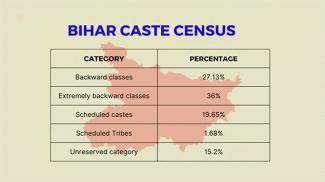At a time when the Narendra Modi government has failed to conduct the decadal census, Bihar has moved ahead and conducted a caste survey of the state’s population. Defying the BJP’s desperate attempts to stall the survey, or at the least the publication of its findings, the Bihar government successfully accomplished the caste survey and chose the 154th Gandhi Jayanti to go public with the overall summary of the statistical findings.
Even as we await the detailed socio-economic findings of the survey, the summary already gives us an insightful picture of the caste-community composition of the society in Bihar. One of the pet propaganda points of the Sangh brigade revolves around the so-called Muslim population explosion and Bangladeshi infiltration. The Bihar survey debunks this Sanghi propaganda and tells us that the proportion of Muslim population in the state continues to hover around 17%.
The caste break-up revealed by the survey lends irrefutable credence to the demand for a countrywide caste census which, in turn, should pave way for an urgent rationalisation of the reservation formula. Bihar survey figures put the OBC community at close to 64% of the total population and the general category at less than 16%. The reservation policy, however, stands in sharp contrast to this numerical balance.
The current percentage of OBC reservation is fixed at 27%, which is way less than half of the OBC population. By contrast, the general category population now enjoys an assured reservation of 10% – reserved in the name of Economically Weaker Sections, but this effectively amounts to reservation for the general category since SC/ST/OBC categories stand excluded from EWS quota – apart from enjoying disproportionately greater access to general category seats.
The 2011 census had collected caste data as well as data on related socio-economic particulars, but the figures have not been made public. And the Modi government has failed to discharge its responsibility to carry out the decadal census due in 2021. This means there is a major statistical backlog and vacuum affecting rational allocation of resources and implementation of affirmative action to promote social equality. The case for caste census and rationalisation of reservation policy-making cannot be over-emphasised.
The BJP has been playing around with the anomalies within the reservation policy and the widespread perception and reality of exclusion among large sections of SC/ST/OBC communities to develop a cynical model of ‘social engineering’ that sub-divides the claimants of reservation. Instead of expanding the pie of reservation and improving its implementation, the BJP model of social engineering works on the basis of selective co-option and projection of various groups. In the recently concluded special session of the Parliament, Amit Shah tried to silence the debate on glaring lack of OBC representation in the higher echelons of bureaucracy, by pointing to the number of OBC MLAs and MPs within the BJP legislature parties.
While the BJP makes tall claims about political representation of SC/ST/OBCs by showcasing Modi as OBC PM and former President Ramnath Kovind or current President Droupadi Murmu as symbols of SC and ST empowerment, respectively, it has been busy undermining the system of reservation by all possible means. Even as huge backlogs and loopholes affect the implementation of the existing policies of reservation, the BJP has found a way to bypass reservation by promoting lateral entries. The top levels of bureaucracy are filled with handpicked candidates that ensures the ideological control of the RSS as well as domination of the privileged. Relentless expansion of indiscriminate privatisation is shrinking the available pool of government jobs and also weakening the ability of the deprived sections to access them by systematically excluding them from the arena of higher education.
The Modi government already stands exposed for the cynical political game it has played on the issue of women’s reservation. The Bihar caste survey has now underscored the need to challenge the Manuvadi core of the Sangh brigade’s ideological and political design. An updated countrywide caste census leading to an expanded framework of reservation and a reorientation of the economic policy ensuring rejuvenation of the public sector and reversal of the policies of privatisation of education and healthcare is the way forward to secure social and economic justice for India’s oppressed and exploited millions. Dethroning the Modi regime has to be the first decisive step in this direction.











